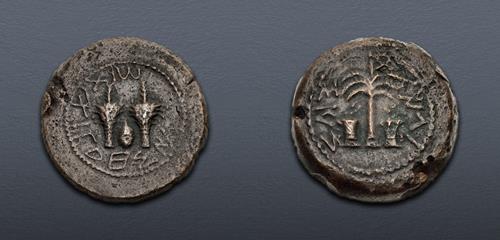
|
JUDAEA, Jewish War. 66-70 CE. Æ Half Shekel (27mm, 17.00 g, 1h). Jerusalem mint. Dated year 4 (69/70 CE).
Triton XXV
Lot: 398. Estimated: $ 7 500
Greek, Bronze, Coin-in-Hand Video
Sold For $ 9 500. This amount does not include the buyer’s fee.
Go to Live
|
|
JUDAEA, Jewish War. 66-70 CE. Æ Half Shekel (27mm, 17.00 g, 1h). Jerusalem mint. Dated year 4 (69/70 CE). Etrog flanked by two lulav bunches; “year four, half” (in Hebrew) around / Palm tree with two date bunches, flanked by baskets of dates; “to the redemption of Zion” (in Hebrew) around. MCR FJR-13, dies O4/R10 (this coin); Kadman 32; Meshorer 211; Hendin 6396; Bromberg 73 = Shoshana I 20215 (this coin); Sofaer 39; Spaer 179–80. Brown surfaces, some minor pitting. Good VF. Rare.
From the Father & Son Collection. Ex Shoshana Collection (Part I, Heritage 3003, 8 March 2012), lot 20215 (hammer $16,500); Abraham Bromberg Collection (Part I, Superior, 5 December 1991), lot 73.
By Year 4 of the Jewish War (69/70 CE), the Romans had gained the initiative and the rebellion was in dire straits. The Jews of Jerusalem were desperately short on supplies and engaged in bloody internecine battles for political control of the remaining rebel forces. The shortage of precious metals witnessed a severe drop in the number of silver shekels and their fractions from the temple mint (see previous lot). It also resulted in what has been called the world’s first issue of “siege coins.” This consisted of bronze coins intended to circulate along with the silver shekels, inscribed “half” and “quarter,” along with a much smaller denomination without a value that is surely an eighth-shekel. The large half-shekels are, by far, the rarest of these, with surviving specimens numbering in the mid thirties. The symbolism of the bronzes is distinct from that of the silver shekels, emphasizing Feast of Tabernacles on the holy day of Sukkot. Here the obverse depicts two lulavs (bound palm branches) and an etrog (citron fruit), while the reverse depicts a seven-branched palm tree (perhaps symbolizing the Menorah) flanked by two date baskets. The Paleo-Hebrew reverse inscription “to the redemption of Zion” marks a departure from previous coin slogans calling for the “freedom of Zion,” perhaps indicating awareness that the flame of freedom would soon be snuffed out by the Romans, and that any salvation would be more spiritual than physical.
The final winners of all Triton XXV lots will be determined at the live public sale that will be held on 11-12 January 2022. Triton XXV – Session Two – Greek Coinage (Part 2) through Roman Provincial Coinage will be held Tuesday afternoon, 11 January 2022 beginning at 2:00 PM ET.
Winning bids are subject to a 20% buyer's fee for bids placed on this website and 22.50% for all others.
We recognize that our users may have various Internet Browsers and Operating Systems. We like our visitors to have the best possible experience when using our bidding platform. However, we do recognize that it is impossible to develop applications that work identically, efficiently and effectively on all web browsers. The CNG bidding platform supports the latest stable major version and the stable previous version of Mozilla Firefox and Chrome.
|
